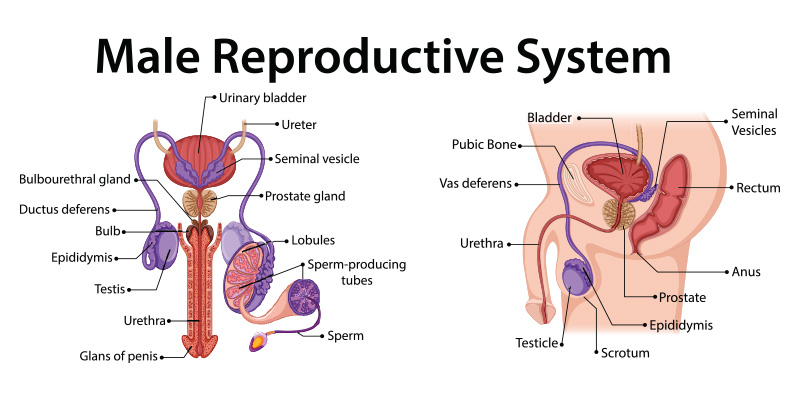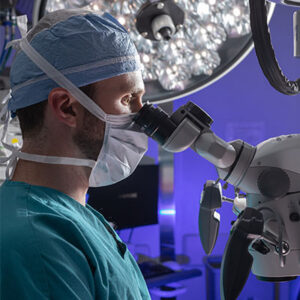
What is MicroTESE?
Microsurgical testicular sperm extraction (microTESE) is the gold standard surgical approach for sperm retrieval for men with non-obstructive azoospermia (sperm count so low that no sperm is visible in the ejaculate).
In this surgical procedure, a specialist retrieves sperm from the seminiferous tubules of a male’s testes using a surgical microscope.
A specialist typically recommends microTESE for men who:
- Have low sperm production resulting in azoospermia
- Genetic test results are consistent with the possibility of having sperm found
MicroTESE is a more extensive procedure than a conventional TESE procedure. It also improves the likelihood of finding sperm by about 3x that of conventional TESE, with specialists finding sperm approximately 50% of the time during microTESE procedures.
MicroTESE is also more extensive than the other sperm retrieval techniques, primarily used for men with an obstruction or high DNA fragmentation, including TESE, TESA, and the epididymal sperm retrieval surgeries, PESA and MESA*.
*TESE: Testicular Sperm Extraction, TESA: Testicular Sperm Aspiration, PESA: Percutaneous Epididymal Aspiration, MESA: Microsurgical Epididymal Sperm Aspiration

What happens during a MicroTESE procedure?
With this procedure:
- This outpatient procedure takes about 3 hours and is done in the office with numbing medication and twilight sedation
- The surgeon makes a very small (2-3 cm) incision in the midline of the scrotum
- The surgeon uses a specialized operating microscope (40X magnification) to find pockets of sperm production in the seminiferous tubules in the testicles
- Tissue samples are taken from the tubules in the testicle(s) to be examined under a microscope for sperm
- The incision is then closed with very fine stitches that are later absorbed
- If the careful searching process does not find sperm in one testicle, the other testicle is searched
- Any sperm found in this procedure can be used for in-vitro fertilization but not an intrauterine injection (IUI)
- Success rates vary between 20-70% depending on individual factors discussed during the initial consultation
- This procedure can either be performed in coordination with the female partner’s egg retrieval or as a separate procedure before the IVF cycle, during which time the sample can be frozen
Why are extracted sperm only viable for IVF?
Extracted sperm can be used fresh or frozen in liquid nitrogen in future reproductive treatments, such as in-vitro fertilization (IVF) with intracytoplasmic sperm injection (ICSI). The sperm must always be used for IVF because surgically retrieved sperm have not yet learned how to swim. They cannot swim to fertilize an egg if placed inside the uterus. Also, the number of sperm retrieved is only enough for IVF.
Post-Surgery Care
Most men recover quickly and have minimal but controllable pain after surgery. Ice, anti-inflammatory medication, and Tylenol are the mainstay treatment for pain control after surgery.
After surgery, the majority of patients:
- Use an ice pack for the first 48 hours in addition to tight scrotal support
- Take prescription-strength anti-inflammatory medication and 1000 mg of Tylenol every 6 hours. Rarely, stronger narcotics are needed to eliminate more severe pain
- Should avoid sexual activity for a week and vigorous exercise for two weeks after the surgery
Risks with MicroTESE are rare
While risks with MicroTESE are extremely rare (less than 5%), if complications do occur, they may include the following:
- Infection
- Bleeding
- Decrease in testosterone production
- Chronic pain
- Decrease in size of the testicle

Dr. Matt Coward
Male Fertility Specialist
The Atlantic Difference
Atlantic Reproductive Medicine, and Dr. Matt Coward, offer our patients the most advanced medical techniques in MicroTESE.
If you are interested in learning more about sperm retrieval and MicroTESE, call Atlantic Reproductive Medicine
today for a consultation @ (919) 248-8777.
Male Fertility Treatments

Causes of Male Infertilty
A common misconception is that an infertility problem usually lies with the female. The reality is that half of all infertile couples have a contributing male factor.

Vasectomy Reversal
Vasectomy reversal is a surgical procedure to undo a vasectomy and when done by a skilled surgeon it is successful on most men.

MicroTESE
Microsurgical testicular sperm extraction (microTESE) retrieves sperm from the seminiferous tubules of a male’s testes in men with non-obstructive azoospermia.

No-Scalpel, No-Needle Vasectomy
No–scalpel, no-needle vasectomy is the least invasive form of vasectomy, a safe and effective form of birth control for males who are confident they do not want to father a child in the future.

Semen Analysis
Semen analysis evaluates the quality and volume of a sperm in semen. It is one of the first steps to detect male infertility issues.

Azoospermia & Abnormal Semen Quality
Azoospermia is the absence of sperm in the ejaculate. Abnormal semen quality in ejaculate refers to quality issues with sperm in the semen that can make the sperm unable to achieve fertilization of an egg.

Varicocele
A varicocele is a dilated vein within the scrotum which holds and protects the testicles. It can occur in one or both testicles and can cause male infertility.

Ejaculatory Dysfunction
Ejaculatory dysfunction is among the most common sexual disorders but there are many solutions, including medications, assistive neurostimulatory methods, and surgical sperm retrieval.

Sperm Selection
Sperm selection can separate highly motile, normal sperm from those of lower quality which is critical for fertility treatments such as intrauterine insemination (IUI), in vitro fertilization (IVF), or intracytoplasmic sperm injection (ICSI).

Sperm Retrieval
Sperm retrieval (harvesting) is done to find and retrieve sperm from the testis or epididymis in men who want to achieve pregnancy but have no sperm in their ejaculate.

